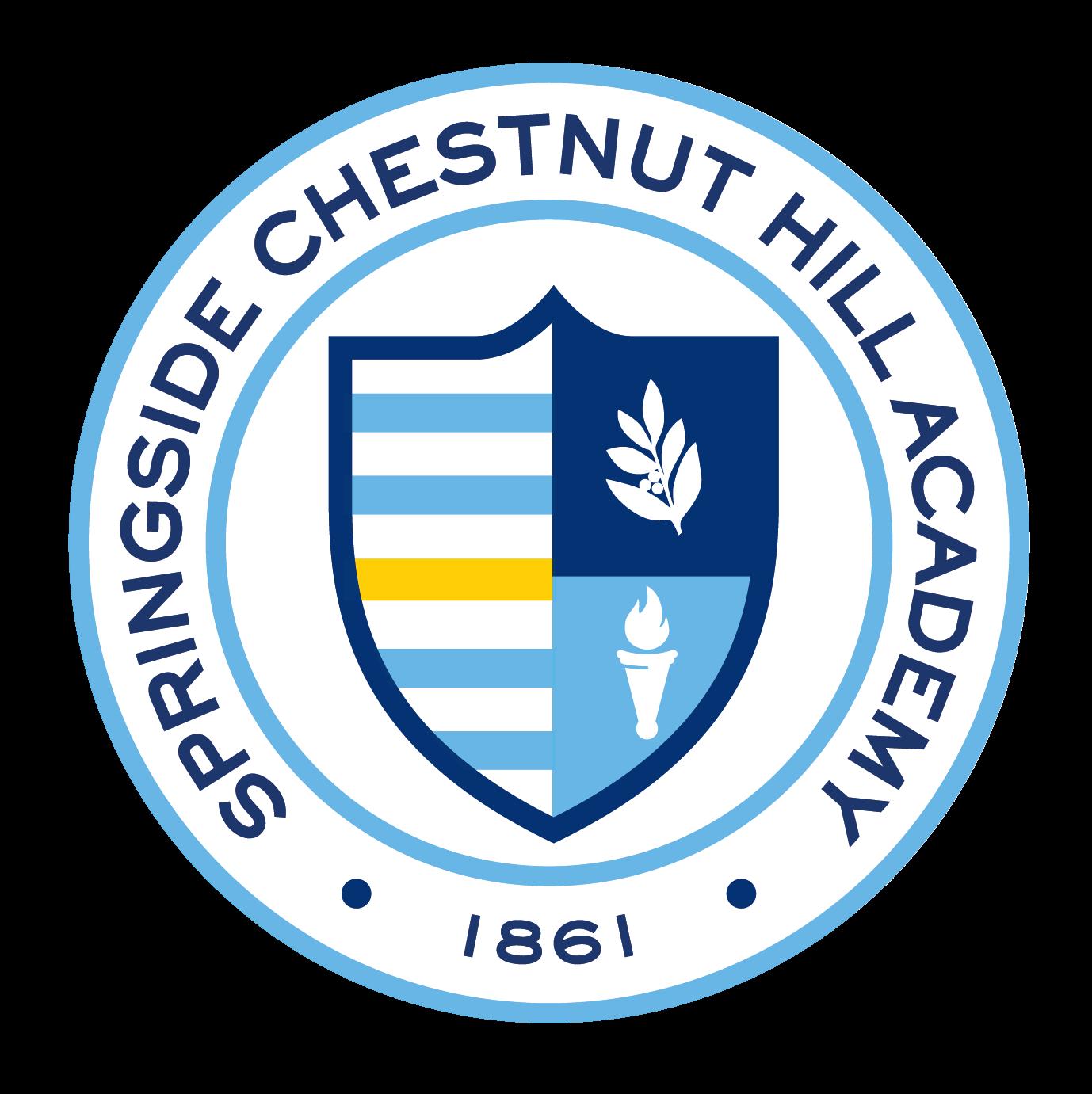
SPRINGSIDE CHESTNUT HILL ACADEMY


SPRINGSIDE CHESTNUT HILL ACADEMY
pre-k—4th grade


In Lower School, we meet children where they are developmentally with rigorous academics in a supportive and nurturing environment. We have high expectations for all of our students, and we work to achieve our goals through building strong relationships with students and families, carefully measuring student progress, and providing support and challenges along the way.
Our fantastic teachers are the heart of our Lower School. In every classroom, it is a priority to know each student’s strengths, interests, and areas for growth. Our students feel cared for and connected through their strong relationships with their teachers. As a result, they are able to be consistently challenged in their work and supported in their growth.
Lower School students have the opportunity to experience a wide range of disciplines during these early years of learning, including science, art, music, physical education, outdoor education, and entrepreneurship. Our faculty work together to continually refine our programming to ensure that students learn deeply about topics in a variety of interdisciplinary ways.
Social-Emotional Learning is a priority in the Lower School. Through explicit instruction in each classroom as well as targeted support in small groups or individually, our students are taught the tools they need to successfully manage their emotional lives and their relationships.
Our Lower Schoolers are also taught about the importance of SCH’s five core values: courage, integrity, thoughtfulness, resilience, and diversity through assemblies, books, and discussions with their teachers and peers.
The Lower School, housed in the breathtaking, state-of-the-art McCausland Lower School, offers our students an unparalleled elementary educational experience with easy access to the Wissahickon Valley for exploration, observation, and content-focused work.
Warmly,
Douglas Wainwright Head of Lower School
Hear more from Douglas Wainwright by scanning the QR code!

Curriculum At-A-Glance Pages 1-17
Grade Levels At-A-Glance
Pre-K Page 18
Kindergarten Page 19
First Grade ............................................................................................. Page 20
Second Grade Page 21
Third Grade Page 22
Fourth Grade Page 23
Developing the Whole Child Page 24
At SCH Academy’s Lower School, students learn in single-sex divisions—an intentional structure that creates space for focus, voice, and self-discovery during a pivotal stage of development. We believe that these learning environments foster deep confidence and engagement.
In our single-sex environments, students are more likely to take healthy risks, explore new interests, and lead authentically. Our rigorous academics, hands-on departmental classes, and responsive teaching are tailored to meet students where they are both intellectually and emotionally.
In the Lower School, students learn who they are through authentic experiences. They listen and lead, think and create, challenge themselves, and support each other. And they do it all in a community built on meaningful relationships with peers and teachers who know and value them deeply.

At SCH, we empower students to think critically, communicate clearly, and engage with diverse perspectives. We value both the mastery of foundational skills and the deep background knowledge necessary for true comprehension. Our approach develops confident, thoughtful readers and communicators who are prepared to thrive in a complex world.
Reading is a layered process built on a foundation of interconnected skills. In the early years, literacy instruction at SCH is grounded in a structured, systematic approach. The literacy program Fundations provides multi-sensory instruction in phonics, spelling, and handwriting, while Heggerty builds students’ phonological and phonemic awareness, which are critical building blocks for reading success. Together, these programs ensure that students gain decoding and fluency skills with confidence and accuracy.
As fluency grows, students engage more deeply with the meaning, craft, and complexity of text. Beginning in Kindergarten, our core language arts curriculum, Wit & Wisdom, offers intellectually rigorous, knowledge-rich units centered on compelling texts and essential questions. Through carefully selected texts and guided discussions, students learn to recognize multiple perspectives, develop empathy, and think critically about fairness and community.
To support clear and confident written communication, students develop strong handwriting skills in the early grades, transitioning to cursive writing in 3rd grade. As technology skills become increasingly important, keyboarding instruction begins in the lower grades to build efficiency, accuracy, and readiness for digital communication.

• Develop a lifelong love of reading and an appreciation for diverse genres.
• Build strong foundational reading skills.
• Communicate with confidence and effectiveness in oral settings.
• Write with stamina, clarity, and voice across multiple genres.
• Analyze and respond to texts with insight and precision.
• Construct and present persuasive oral arguments.
• Engage in active listening and participate in thoughtful, respectful discussions.
• Build a deep background knowledge base in humanities and the natural world
• Appreciate the importance of multiple perspectives
• Recognize how historical and environmental contexts shape current events and issues.
• Ask meaningful questions, conduct research using credible sources, and evaluate evidence to form reasoned conclusions.
• Apply learning across disciplines, extending knowledge and skills into the arts, sciences, movement, and other creative or experiential domains.


In the Lower School, mathematics is taught as a language for thinking that equips students with strong numeracy, problem-solving skills, and the confidence to apply them in any context. Across every grade, they learn to approach challenges with logic, flexibility, and perseverance, developing a toolkit of strategies that extend beyond the classroom. Our core program, Math in Focus, builds deep foundational skills. By cultivating fluency and flexible thinking, they learn to analyze problems from multiple perspectives, choose effective approaches, and use mathematics as a powerful tool for understanding and engaging with the world around them.
Lessons follow the Concrete–Pictorial–Abstract progression, ensuring that students first experience concepts physically, then represent them visually, and finally apply them symbolically. Through whole-class discussions, small-group explorations, and independent practice, they learn to express their reasoning clearly and accurately. As a complement to classroom instruction, students may use adaptive tools such as Happy Numbers, IXL, and ALEKS for individualized reinforcement and practice.
Mathematics Program Goals
• Develop mathematical thinking by enabling students to reason, problemsolve, and communicate effectively about mathematical ideas.
• Strengthen number sense through varied contexts that build mastery of numerical skills.
• Integrate mathematical strands of number operations, number theory, geometry (2D and 3D), algebraic thinking, measurement (time, money, distance), and data analysis and emphasize their interrelationships.
• Connect math to real life so students see its relevance in everyday experiences and problem-solving.
• Build a strong foundation at each grade level, preparing students to become confident, capable, and comfortable mathematical thinkers.
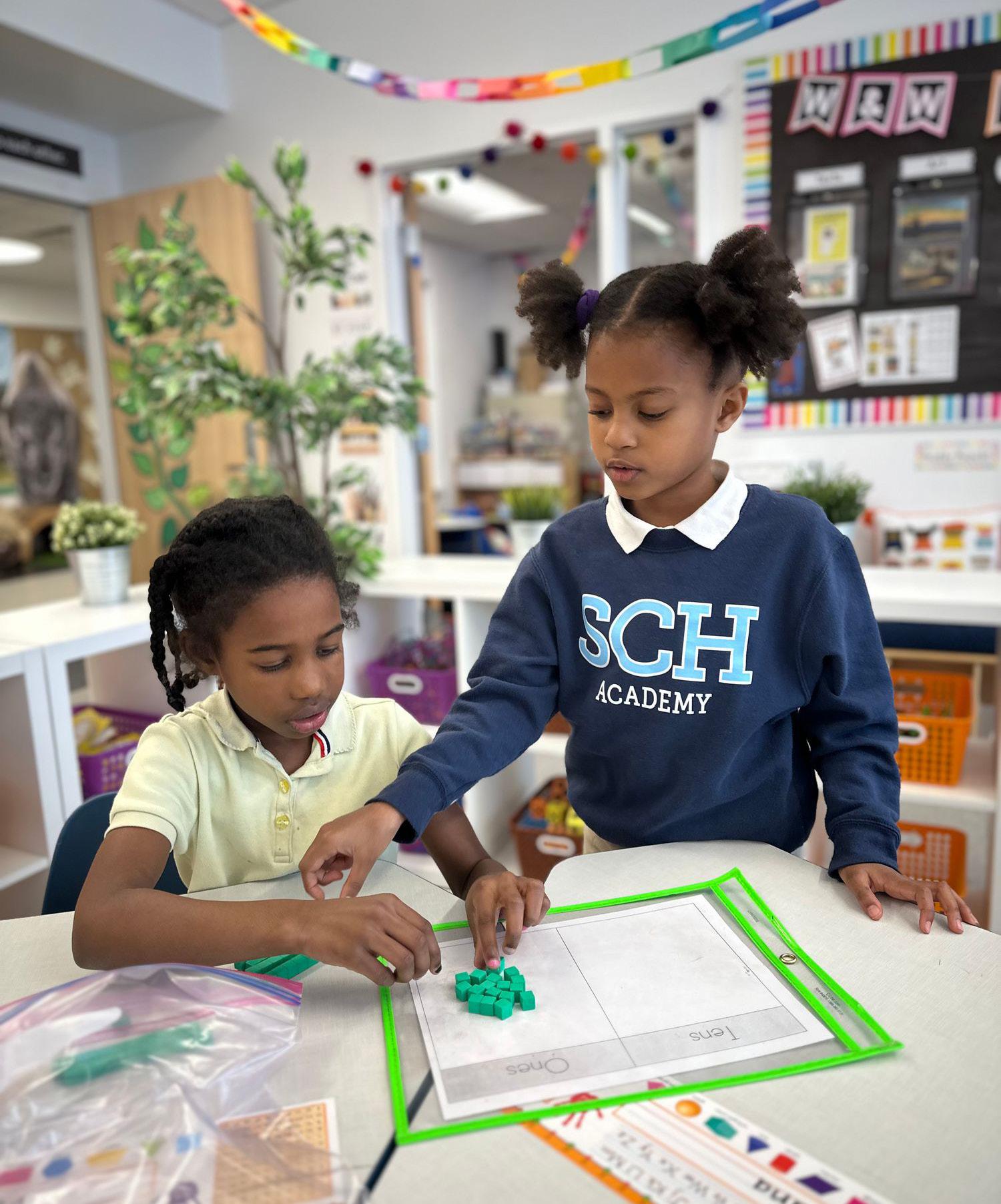


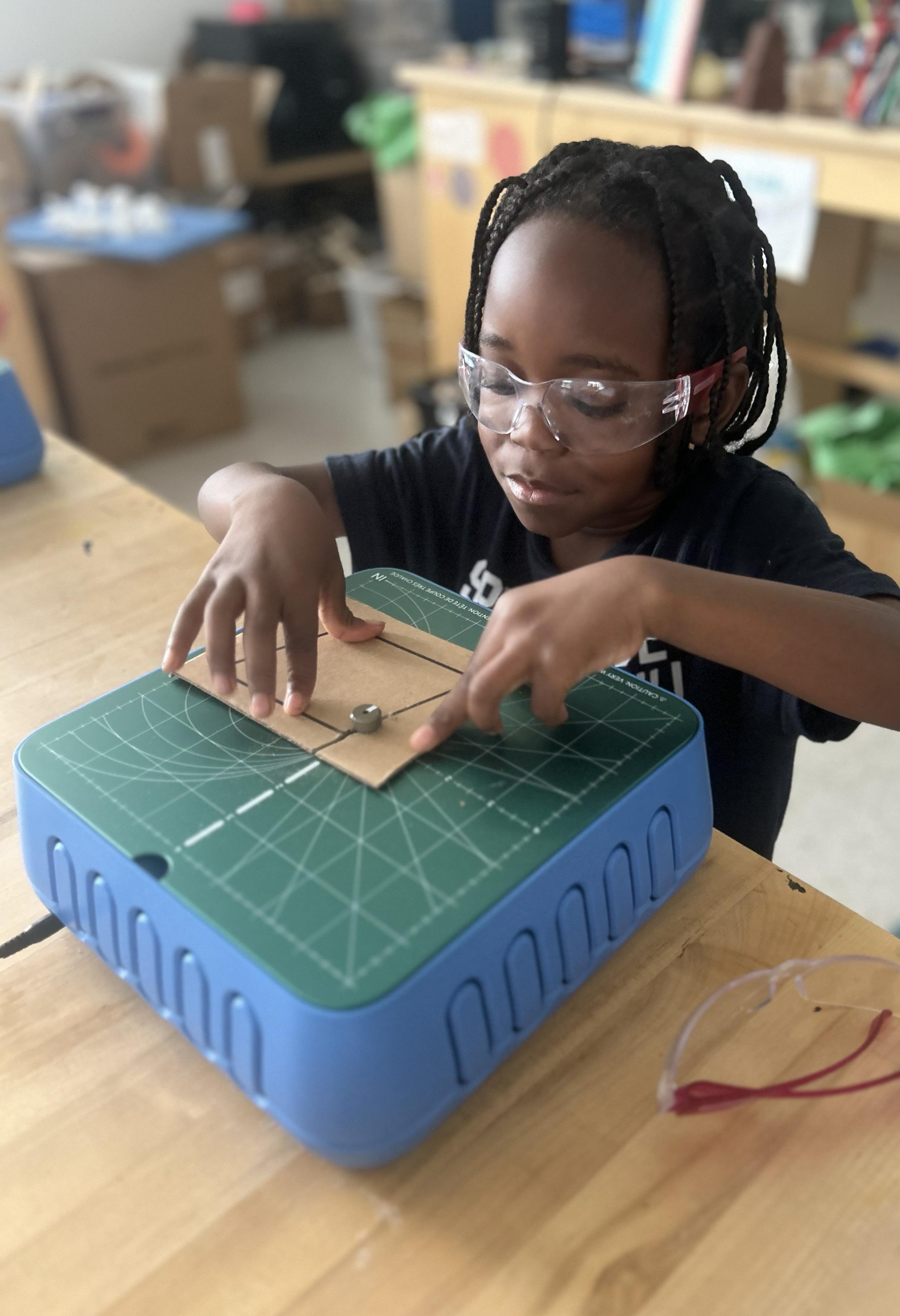
(Alphabetical Order)
The Center for Entrepreneurial Leadership (CEL) empowers SCH Lower School students to grow as thinkers, creators, and collaborators. They learn to listen deeply and respond with empathy, developing the social awareness to value perspectives different from their own. Through creative problem-solving, they explore real-world needs and brainstorm innovative solutions, often working in teams that celebrate successes and approach challenges as opportunities to learn. Communication skills are honed as students generate thoughtful questions, share constructive feedback, and reflect openly on both achievements and setbacks.
With access to a fully equipped makerspace, students harness technology to bring their ideas to life by designing, building, and refining projects with purpose. They might create animations through stop-motion film making, experiment with AI tools, construct large-scale prototypes using cardboard engineering tools, or bring precision to their designs through laser cutting and 3D printing. Because the curriculum is intentionally flexible, projects evolve in response to student interests and the needs of the school and local community. Students also begin to see the power of data, collecting and analyzing information to guide decision-making, and older students expand this understanding into the realm of finance, exploring concepts such as budgeting, profit, and supply and demand.
• Empathy—Students listen attentively to others’ perspectives and respond in ways that demonstrate understanding and respect.
• Creative Problem Solving—Students engage in discussions to identify realworld needs and generate possible solutions.
• Teamwork & Collaboration—Students give and receive positive feedback and engage in constructive conversations about project challenges and failures.
• Communication—Students formulate and ask relevant questions, discuss setbacks productively, and participate in feedback exchanges that build ideas and improve outcomes.
• Technology—Students use tools and equipment in a fully outfitted makerspace to enhance, prototype, and execute their ideas.
• Finance & Data Literacy—Students collect and analyze data through interviews and surveys; older students will apply introductory financial concepts such as supply and demand, budgeting, profit, and loans.
The Lower School library is a central hub for building strong literacy skills, fostering curiosity, and encouraging a lifelong love of reading. Students are empowered to become critical thinkers, developing the skills and confidence to navigate a world rich in information and ideas. Literacy is nurtured through a wide range of experiences that help children see themselves as readers, discovering their own preferences, strengths, and passions.
Through collaboration with classroom teachers, the library program ensures that students grow into competent, ethical users and seekers of information, whether for academic purposes or personal enjoyment. Instruction in digital citizenship helps students evaluate sources, use technology responsibly, and engage respectfully in online spaces. Guided research experiences build the skills to locate, analyze, and synthesize information from both print and digital sources.
• Empower students to develop as critical thinkers and lifelong learners.
• Promote literacy development and foster a lifelong love of reading.
• Encourage self-awareness as readers by helping students identify their preferences, strengths, and interests as readers and learners.
• Collaborate with teachers to support students in becoming competent, critical, and ethical users and seekers of information in both academic and independent reading contexts.
• Maintain open access to a diverse, balanced collection of resources, across a variety of formats, that meet the informational, curricular, and independent reading needs of the SCH community.
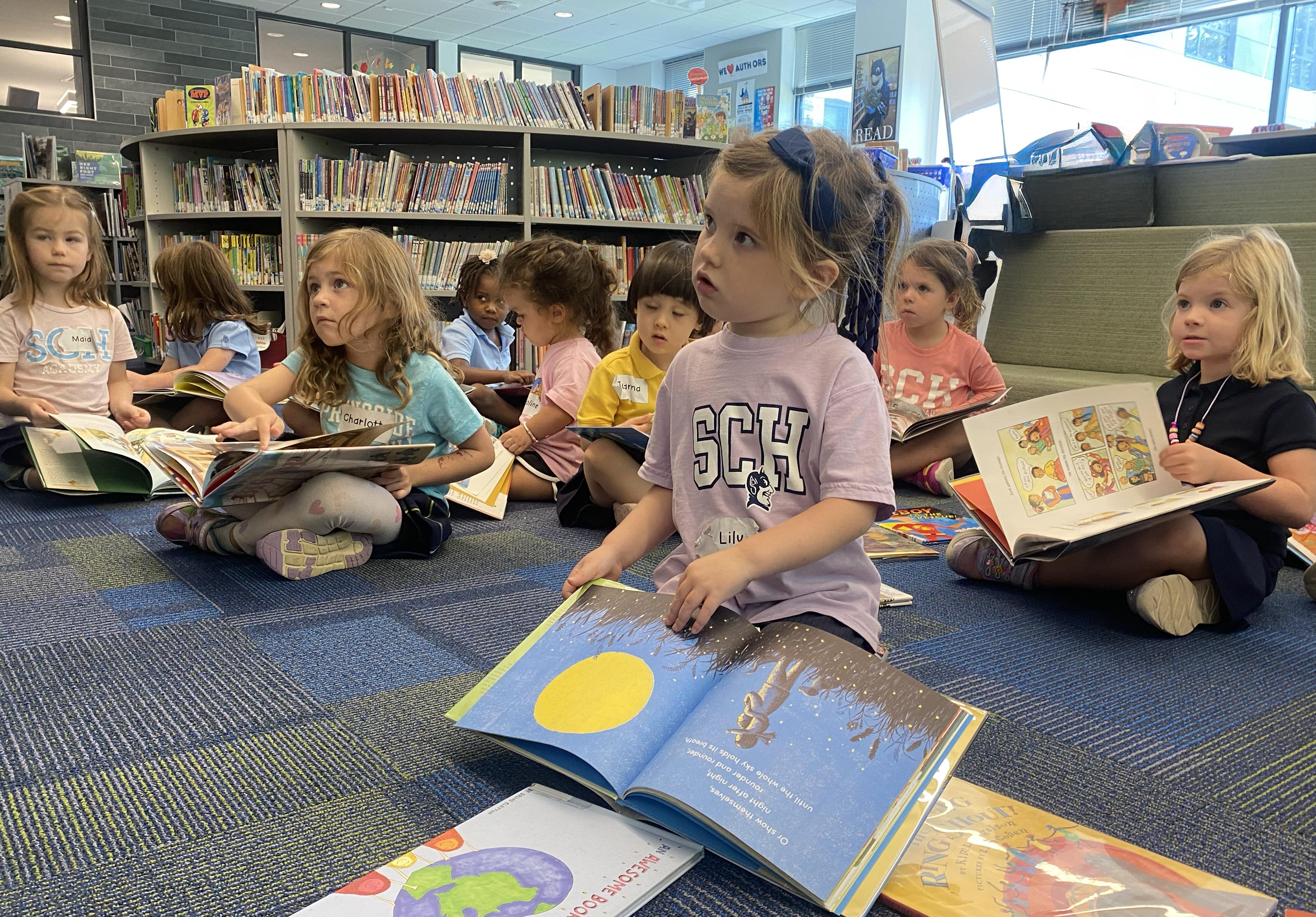
Music in the Lower School invites every child to explore their creativity, voice, and selfexpression. Through singing, movement, dance, instrumental play, spoken word, and dramatic performance, students discover that music is both an art form and a way of understanding the world. The program celebrates a rich diversity of cultural traditions, honors the heritage of our community, and highlights connections to language, history, math, and science.
Third grade marks the start of the instrumental music program with a focus on the recorder, where students build the skills and techniques needed for ensemble performance. In fourth grade, every student studies a band or orchestra instrument and participates in either Girls Choir or Boys Choir. Through these experiences, students grow as musicians, confident communicators, and active members of the school community.
Music Program Goals
• Engage every student in rich, collaborative musical experiences through singing, movement, dance, instrumental play, spoken word, and dramatic expression.
• Develop musical understanding as a unique and meaningful way to know, perceive, and interpret the world.
• Celebrate cultural heritage and community by exploring a diverse repertoire of songs and musical traditions.
• Highlight interdisciplinary connections by showing music’s relevance across all areas of learning and development.

Muddy boots lining the hallways are a familiar sight at SCH! Beginning in 2nd grade, the Outdoor program immerses students in the beauty and challenge of the Wissahickon watershed. Through hikes of increasing difficulty, children come to know its trails, wildlife, and seasonal changes as intimately as their own playgrounds.
Time in nature encourages students to focus on the world and people around them, opening their eyes, ears, and minds. Second graders participate in their first Bike-Hike and test their skills on the rock wall at a local climbing gym. In 3rd grade, adventures expand to include a trip to Hawk Mountain and kayaking on local waters. Fourth graders assist with trail maintenance and develop outdoor survival skills, such as fire building, shelter construction, and navigation, developing teamwork and leadership along the way. Across these experiences, students build courage, resilience, and a deep respect for the land that will stay with them for years to come.
• Develop appreciation for and stewardship of the local environment, particularly the Wissahickon watershed.
• Build courage and resilience through outdoor challenges and experiences.
• Foster observation skills, environmental awareness, and respect for natural spaces.
• Encourage teamwork, cooperation, and shared responsibility for community spaces.



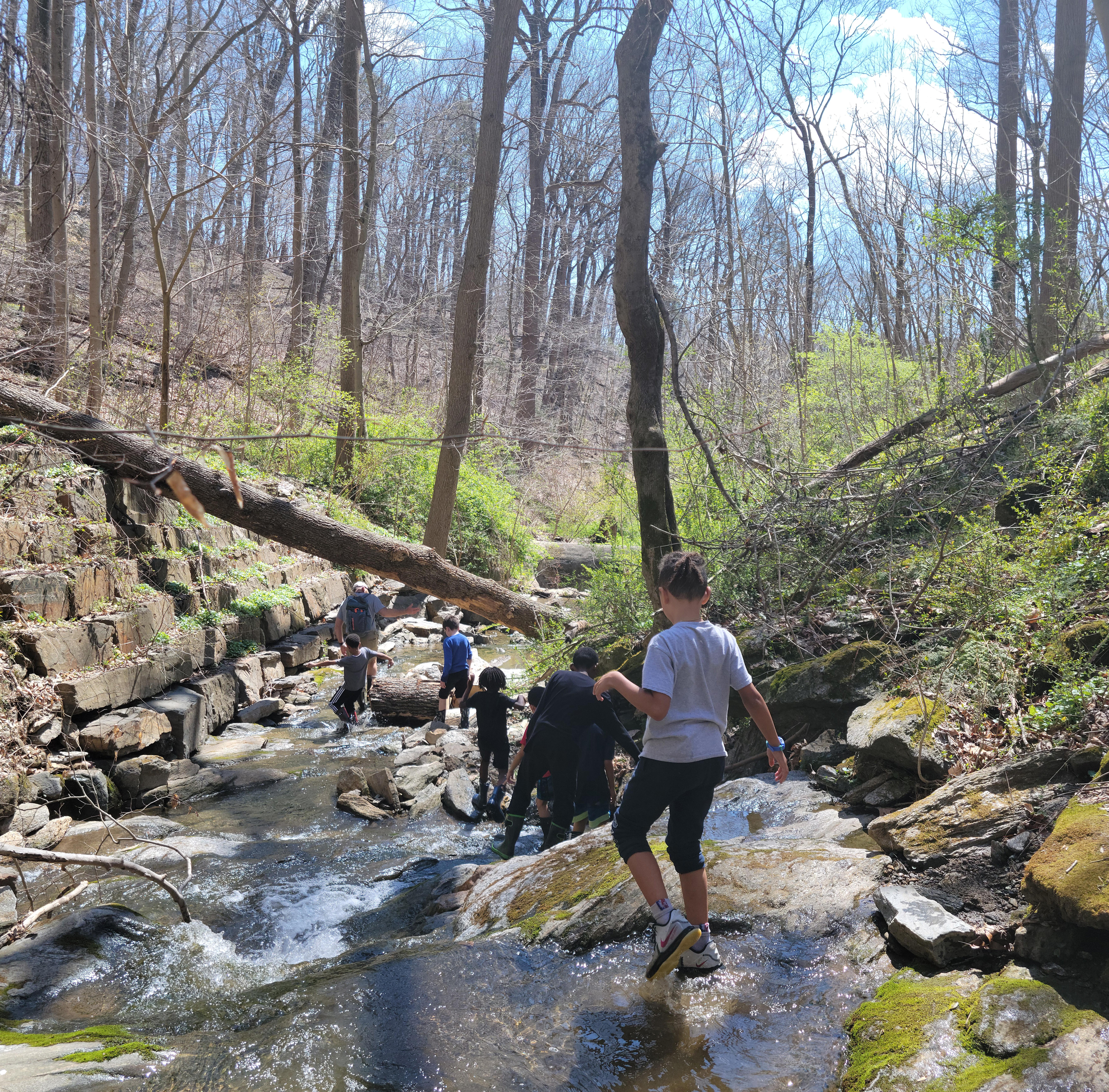


Physical Education in the Lower School is all about learning to move and moving to learn! Through a carefully sequenced program, students build coordination, strength, and endurance, developing the fitness and motor skills that lay the foundation for a healthy, active life. Lessons weave together movement principles, skill development, and teamwork, encouraging students to challenge and express themselves, and enjoy the many benefits of physical activity.
The P.E. program also emphasizes respect, inclusion, and responsible behavior, helping students understand how to work with and support others in diverse activity settings. Fitness is approached holistically, combining cardiovascular health, muscular strength, and flexibility with knowledge about the structure and care of the heart.
• Develop neuromuscular coordination, fitness, and physical growth through a sequential program of physical activities.
• Encourage a physically active lifestyle both in and out of school.
• Achieve and maintain health-enhancing fitness levels through regular activity.
• Demonstrate responsible personal and social behavior in physical activity settings.
• Show understanding and respect for diversity among individuals in physical activity environments.
• Recognize physical activity as a source of enjoyment, challenge, selfexpression, and social connection.

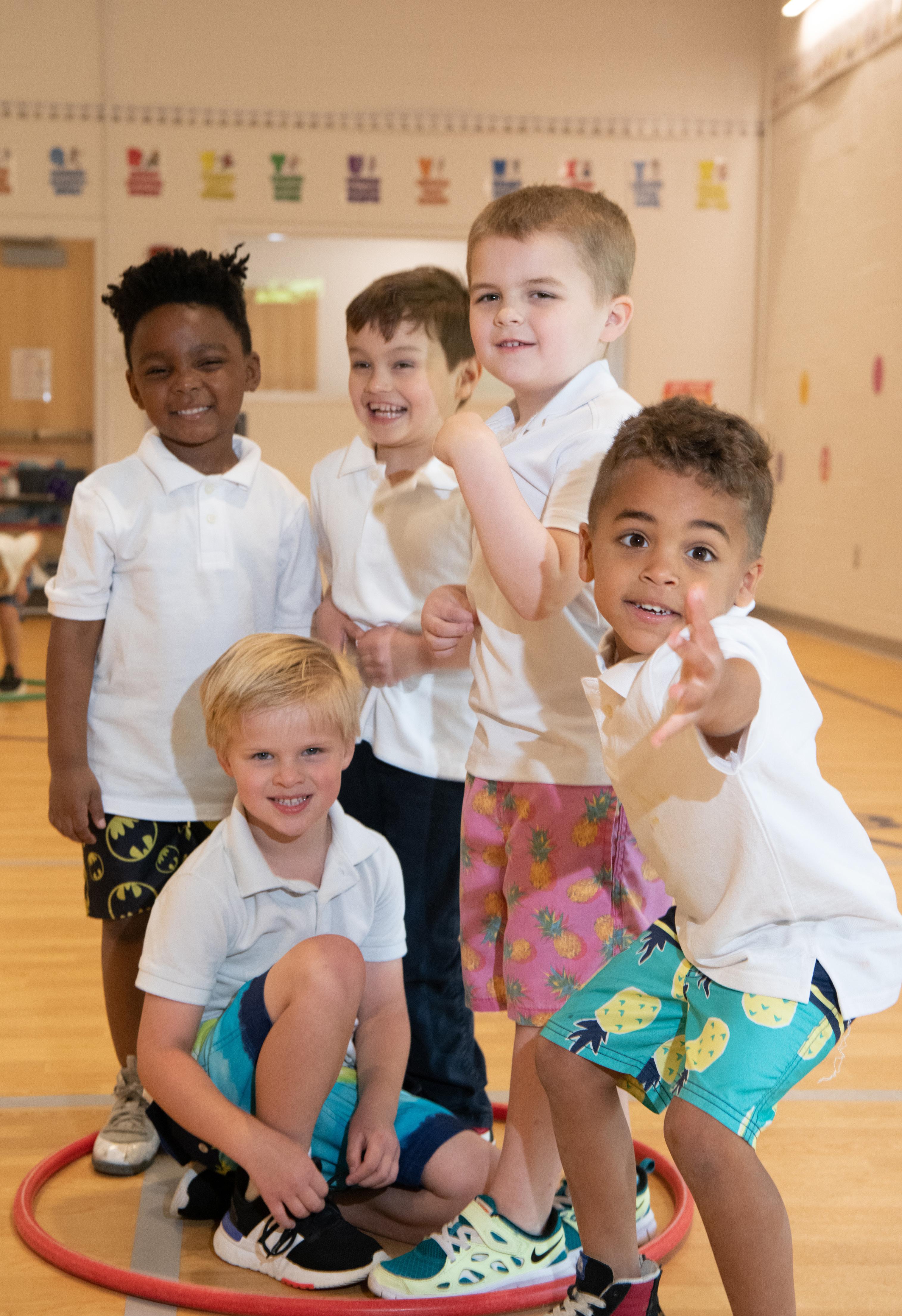

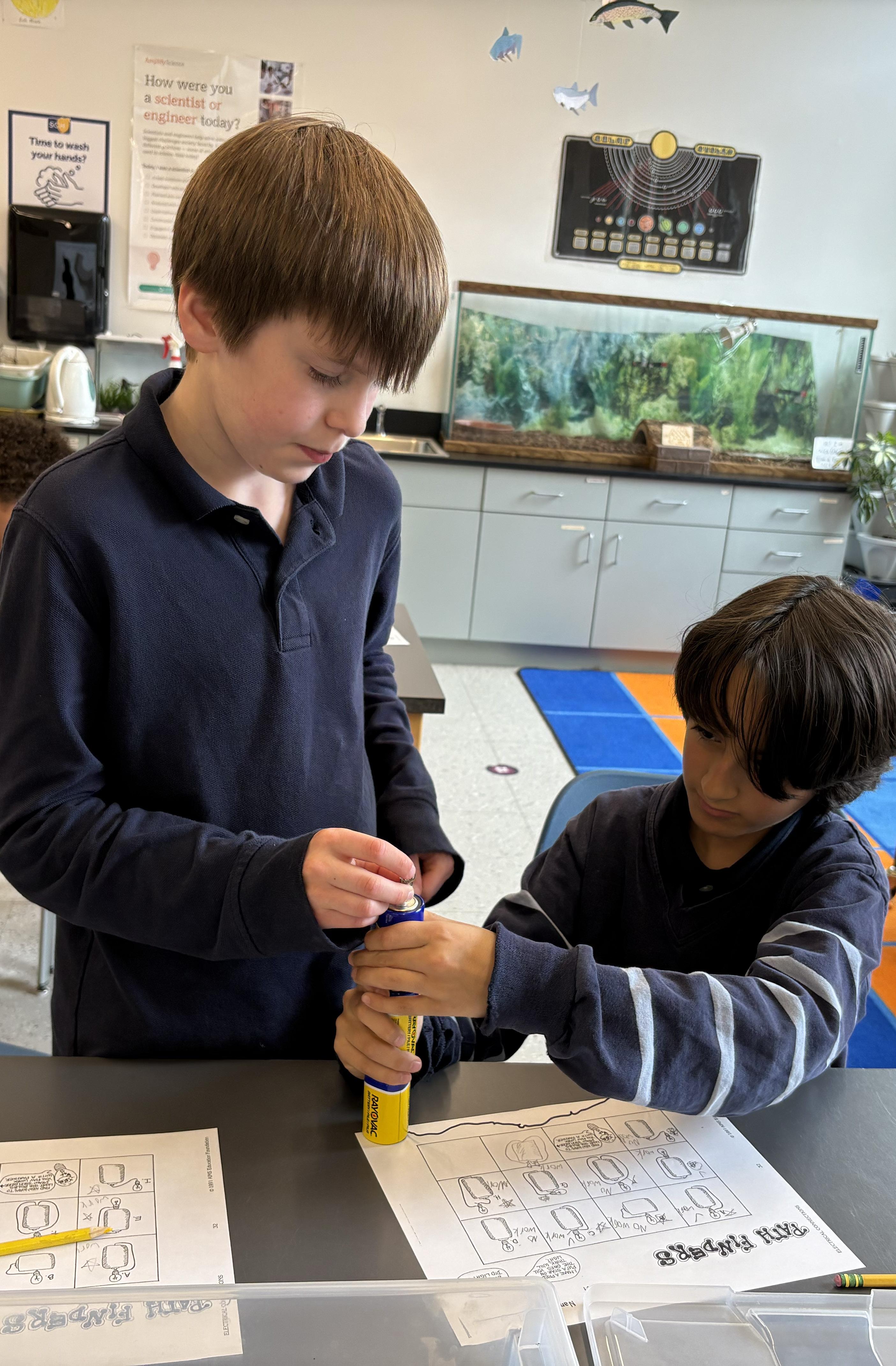


From their youngest years, students see themselves as scientists by posing questions, defining problems, conducting experiments, and analyzing results to draw meaningful conclusions. Science offers a powerful lens for seeing, questioning, and caring for the world, while honing observation, prediction, and reasoning skills that apply to everyday life.
Hands-on investigations span life, earth, and physical sciences at every grade. Younger students might explore the properties of water and air, study bees and pollination, or engineer simple bridges. Older students may dissect owl pellets and join an evening Owl Prowl, test water quality and study macro-invertebrates in the Wissahickon Creek, or design and program simple robots.
All Lower School students participate in Science Outdoors once a cycle. Here, students explore the Wissahickon woods as naturalists by observing seasonal changes, studying local plants and animals, and connecting these experiences to classroom learning. This immersive work builds curiosity, environmental stewardship, and the ability to apply scientific thinking in a real-world habitat.
Whether tracking pollinators in the garden, studying stream ecology, or wiring a circuit, students develop problem-solving skills, deepen their understanding of the natural world, and gain lasting respect for its complexity and beauty.

• Foster students’ identities as scientists by guiding them through the full process of discovery: asking questions, defining problems, designing experiments, making observations, recording data, comparing results, inferring, predicting, analyzing, and drawing conclusions.
• Connect science learning to everyday life—whether in the woods, on the playground, at home, or in the classroom.
• Develop critical thinking and reasoning skills that can be applied to realworld situations.
• Demonstrate the interdependence of living organisms and the impact of human decisions on the Earth’s ecosystems.
• Illustrate that change is constant and often predictable, fostering an understanding of patterns in nature.
• Nurture joy in discovery and an appreciation for the beauty, complexity, and interconnectedness of the natural world.
• Encourage creativity, innovation, and entrepreneurial thinking in scientific exploration.
• Strengthen understanding through research and the development of science-specific vocabulary.
At SCH Academy, art is active and playful, with children working with their hands, experimenting freely, and discovering the joy of turning ideas into tangible creations. They explore a range of media, from drawing, painting, and printmaking to sculpture, ceramics, digital art, and photography, often taking inspiration from the outdoors by using natural materials, studying patterns in nature, or sketching in the Wissahickon. The program blends making with the study of global artists and traditions, fostering visual literacy and appreciation for diverse perspectives. As they work independently and collaboratively, students learn to honor their creative voice and respect the expression of others. Whether shaping clay into pinch pots or creating a digital composition in Adobe, they experience firsthand how art connects imagination, skill, and personal expression.
• Build foundational skills in traditional media—including drawing, painting, printmaking, sculpture, and ceramics—while expanding creative expression through digital art and photography.
• Develop fine motor skills and hand-eye coordination through ageappropriate techniques.
• Explore the elements of art and principles of design such as line, color, shape, texture, and balance.
• Encourage creative risk-taking and problem-solving through open-ended, exploratory projects.
• Develop visual literacy and cultural awareness by studying global artists and artistic traditions.
• Incorporate digital tools and media as a foundation for creative expression and visual storytelling.
• Foster independence and collaboration while cultivating respect for one’s own artistic voice and the creative expressions of others.
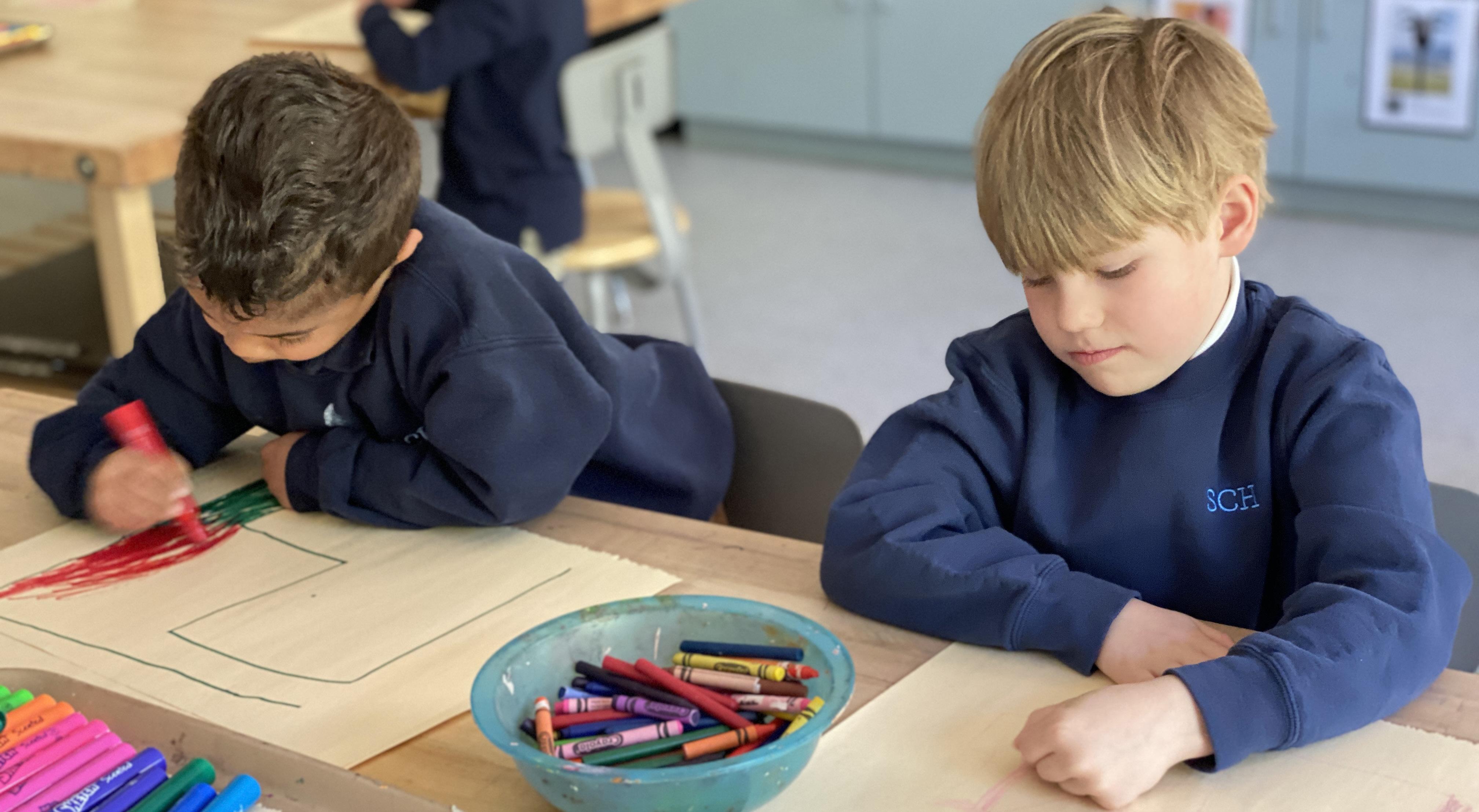
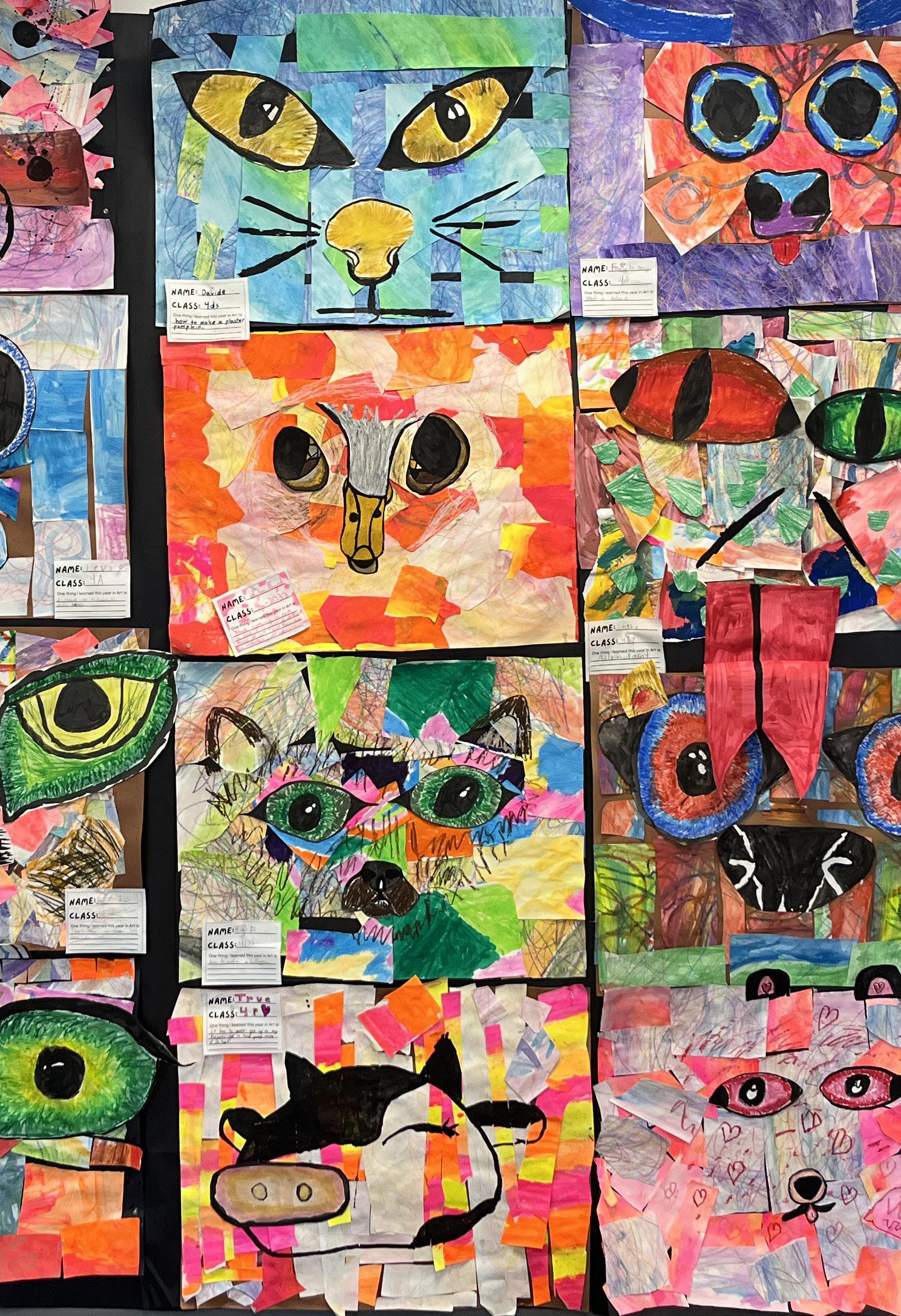


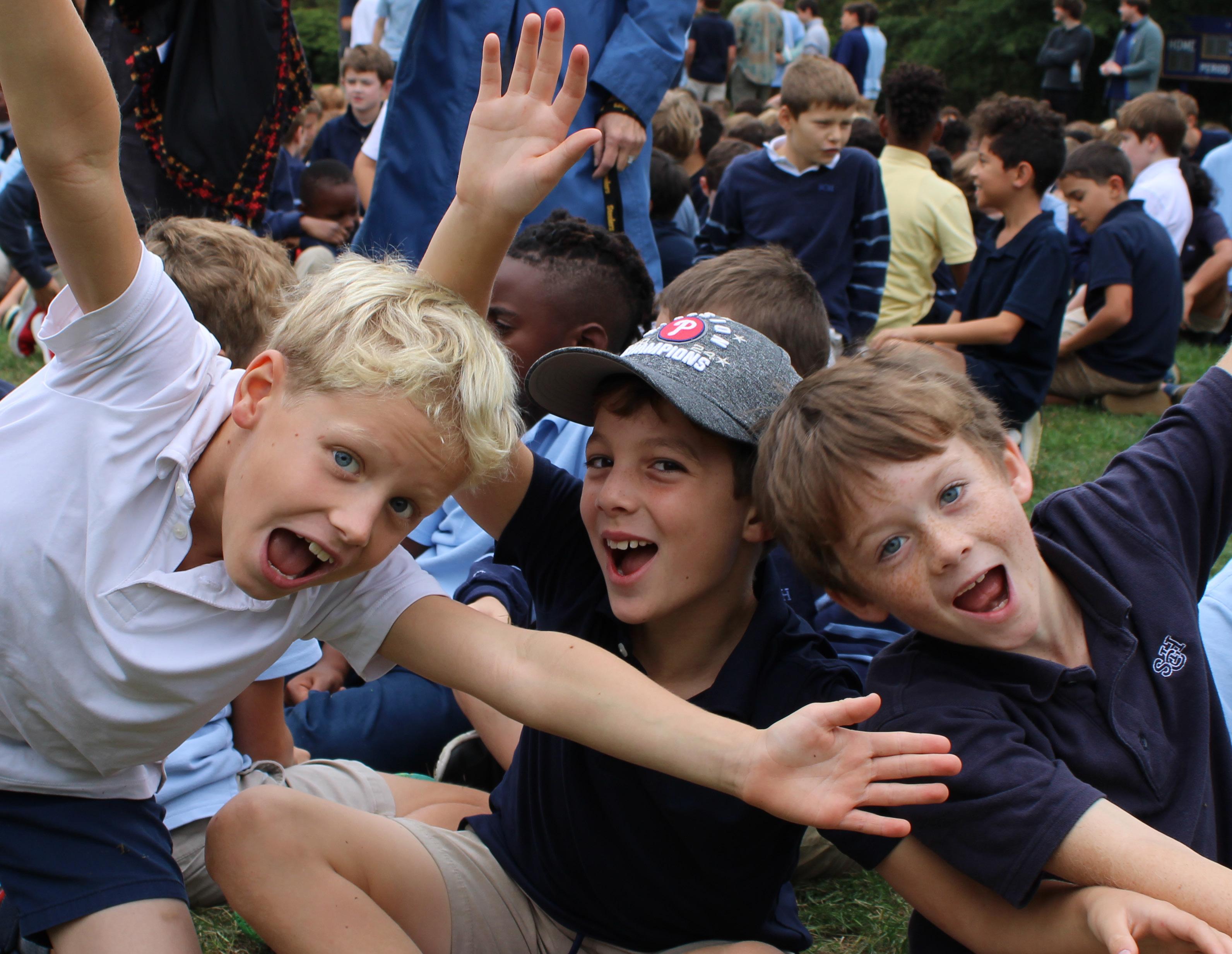
At SCH Academy, Pre-K is a joyful, purposeful year that blends play, outdoor exploration, and emerging academic skills within a nurturing, intellectually engaging environment. Interdisciplinary learning is guided by big ideas that invite children to explore who they are, how the world works, and how they can make an impact through observation, creativity, and care.
Students also begin their Lower School journeys as Brave Smart Girls and Brave Smart Boys, a program that builds positive self-image and purposeful action. Through stories of trailblazers and community-centered experiences, they are introduced to SCH’s five core values: courage, resilience, integrity, thoughtfulness, and diversity.
Pre-K is filled with firsts: holding a newly hatched chick, programming a robot, planting seeds, and performing on stage for an audience. Both in and out of the classroom, children build, experiment, notice patterns in nature, and solve problems together, developing foundational skills in literacy, numeracy, collaboration, and critical thinking. Strong connections with Senior Buddies and 4th Grade leaders help them feel part of a supportive community, ready to step into Kindergarten with confidence.


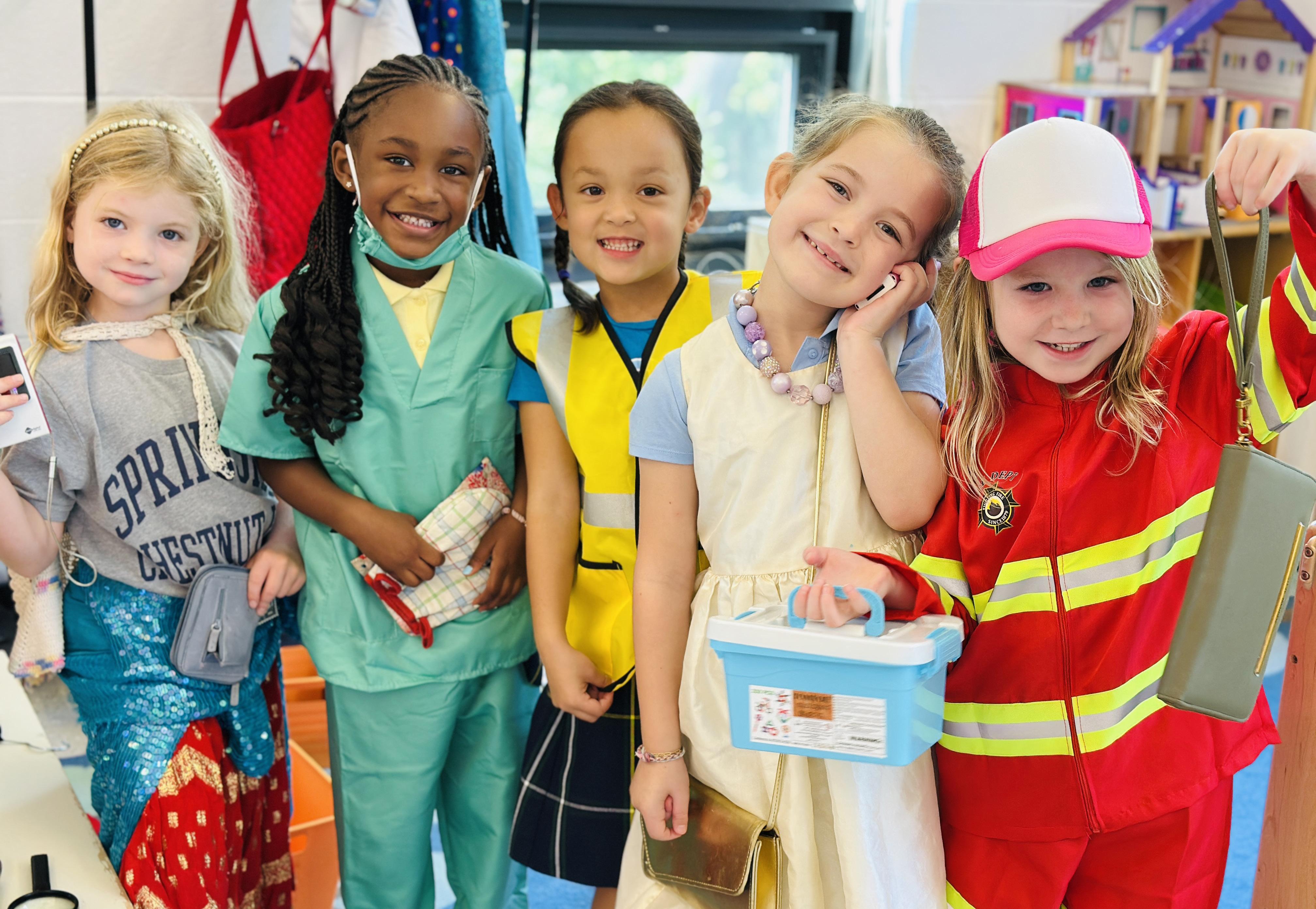
Kindergarten is a year of growing independence, where students begin to see how their classroom connects to the wider world, opening windows into different times, places, and communities. Days are filled with movement, imagination, and discovery, whether sharing books together, exploring in the naturescape, or digging in our school garden.
Interdisciplinary studies give structure and depth to the year: The Five Senses invites students to explore how we experience and interpret the world; Once Upon a Farm follows life cycles, food origins, and the rhythms of the seasons; America, Then and Now sparks curiosity about how daily life has changed over time; and The Continents introduces global geography and the diversity of cultures around the world. By year’s end, students leave Kindergarten with stronger skills, a deeper awareness of the world, and the curiosity to keep exploring it.
Kindergarten is a year full of special experiences that nurture growing independence and developing skills. Students take part in the All Kids Bike Program, laying the groundwork for the traditional 2nd and 4th grade Bike-Hikes. They visit the Penn Museum, where they connect classroom learning to authentic artifacts—linking past and present in ways they can see, touch, and explore. As part of their Once Upon a Farm unit, students also visit a local farm, experiencing firsthand the sights, sounds, and rhythms of farm life.
First grade is a year of discovery, creativity, and big questions. Students become researchers, diving into the fascinating world of animals with unique adaptations, and sharing their findings through imaginative projects. Their studies come alive with a trip to the local zoo, where they see their research subjects face-to-face. Curiosity takes flight during the exploration of powerful forces—wind, water, and beyond— culminating in the joyful Wind Day Celebration and a visit to the Franklin Institute. Along the way, they investigate the delicate work of bees and pollination, trace constellations in the sky, and design and build bridges, learning to think like engineers. Each 1st grade interdisciplinary study opens a new window into the world. A World of Books reveals how access to stories and information can transform lives across the globe. Creature Features invites students to observe, question, and understand the remarkable ways animals survive and thrive. Powerful Forces challenges them to see how humans respond to nature’s strength, while Cinderella Stories celebrates the timeless tale told in cultures around the world. These rich experiences nurture not only academic growth but also empathy, imagination, and a lifelong curiosity about how the world works.


Second grade is a year of adventure, community, and purposeful action. It’s also when students begin SCH’s Outdoor Program, hiking the Wissahickon and noticing the changing seasons firsthand. They ride with their families in the beloved 2nd grade Bike-Hike, and venture out on an evening Owl Prowl, listening for the calls of the nocturnal neighbors they’ve studied in class. Traditions like tapping local sugar maple trees for Maplefest connect them to the rhythms of nature, while visits to the Woodmere Museum inspire creativity through the Artists-at-Work program. Whether scaling rock walls at a local gym or creating products for their philanthropic store, Gifts for Good, students stretch their skills, confidence, and sense of purpose.
Each interdisciplinary study opens a new chapter of exploration. A Season of Change immerses students in the science and beauty of natural cycles. The American West invites them to walk in the footsteps of pioneers and Native Americans, deepening their understanding of history and culture. Civil Rights Heroes inspires them with the courage and conviction of leaders like Martin Luther King Jr. and Ruby Bridges. Good Eating connects personal choices to community and environmental health. Second grade nurtures not only knowledge, but also empathy, resilience, and the drive to make a positive difference.
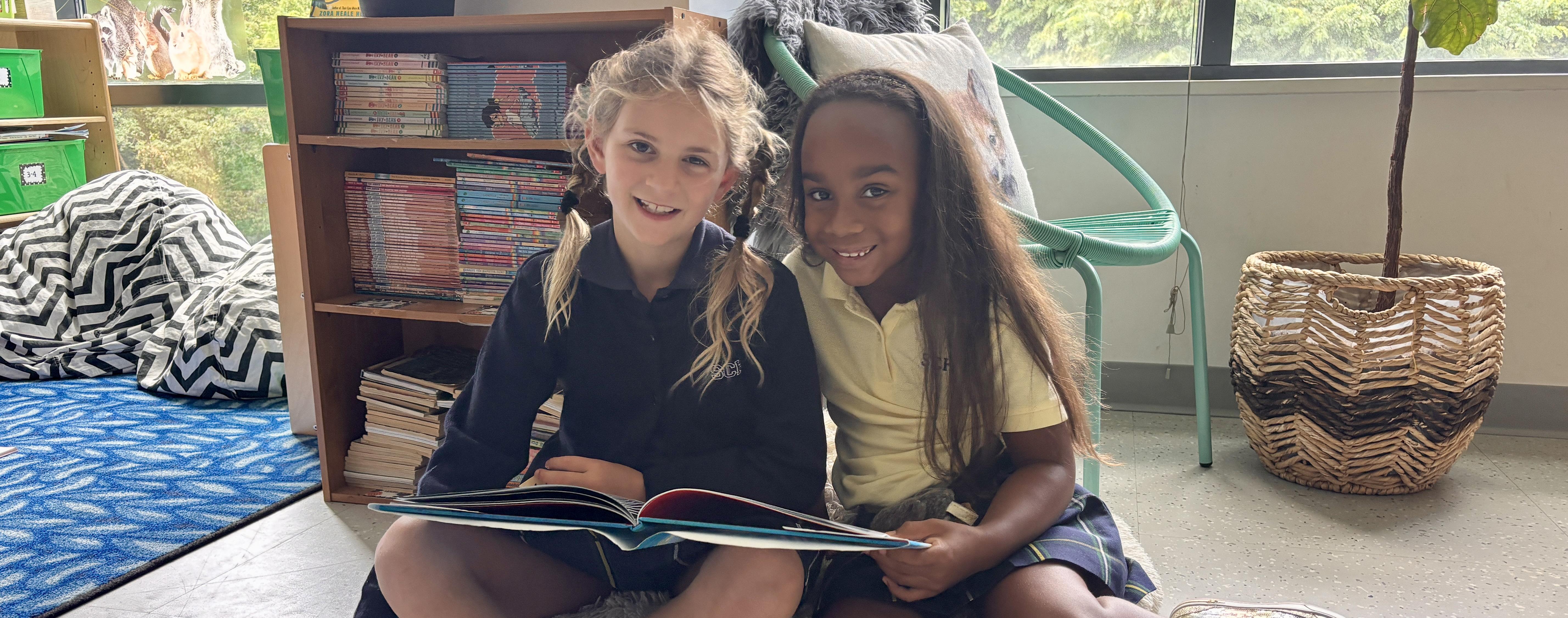

Third grade is a year of exploration: into nature, into history, and into the vastness of the universe. They work alongside experts at Fairmount Water Works to study water treatment and quality, connecting science to real-world impact. Students paddle with their friends on a spring kayak trip, testing their balance and teamwork on the water. At Hawk Mountain, they watch migratory birds sweep overhead, and in the music room, they begin new journeys with the recorder, strings, woodwinds, and brass instruments.
Interdisciplinary studies tie these experiences together. The Sea blends science and art to explore the beauty and mystery of marine life. Outer Space invites students to step into the stories of astronomers and astronauts, expanding both their knowledge and imagination. A New Home brings the experiences of immigrants to life through memoirs, narratives, and visual art, fostering empathy and cultural understanding. Artists Make Art encourages students to develop their own creative voices while learning from masters across disciplines. Third grade nurtures curiosity, inspires selfexpression, and builds the confidence to venture into new worlds.
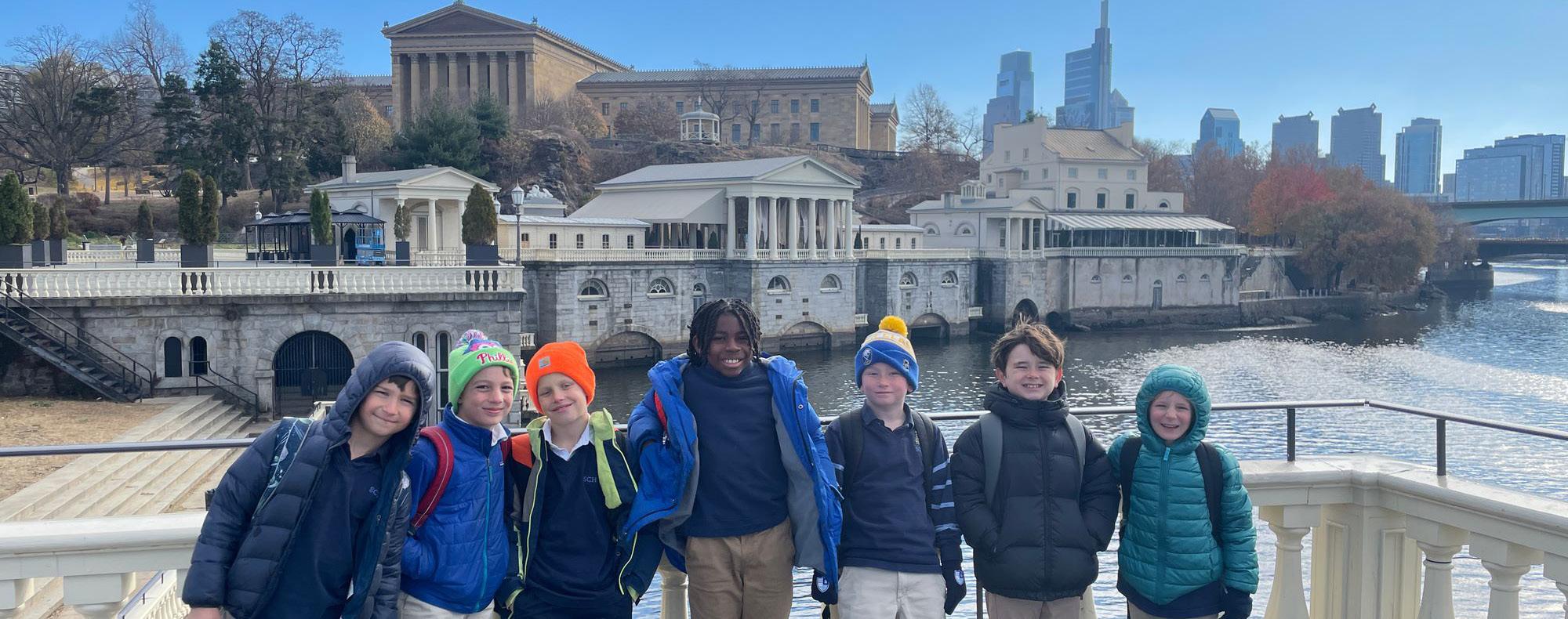
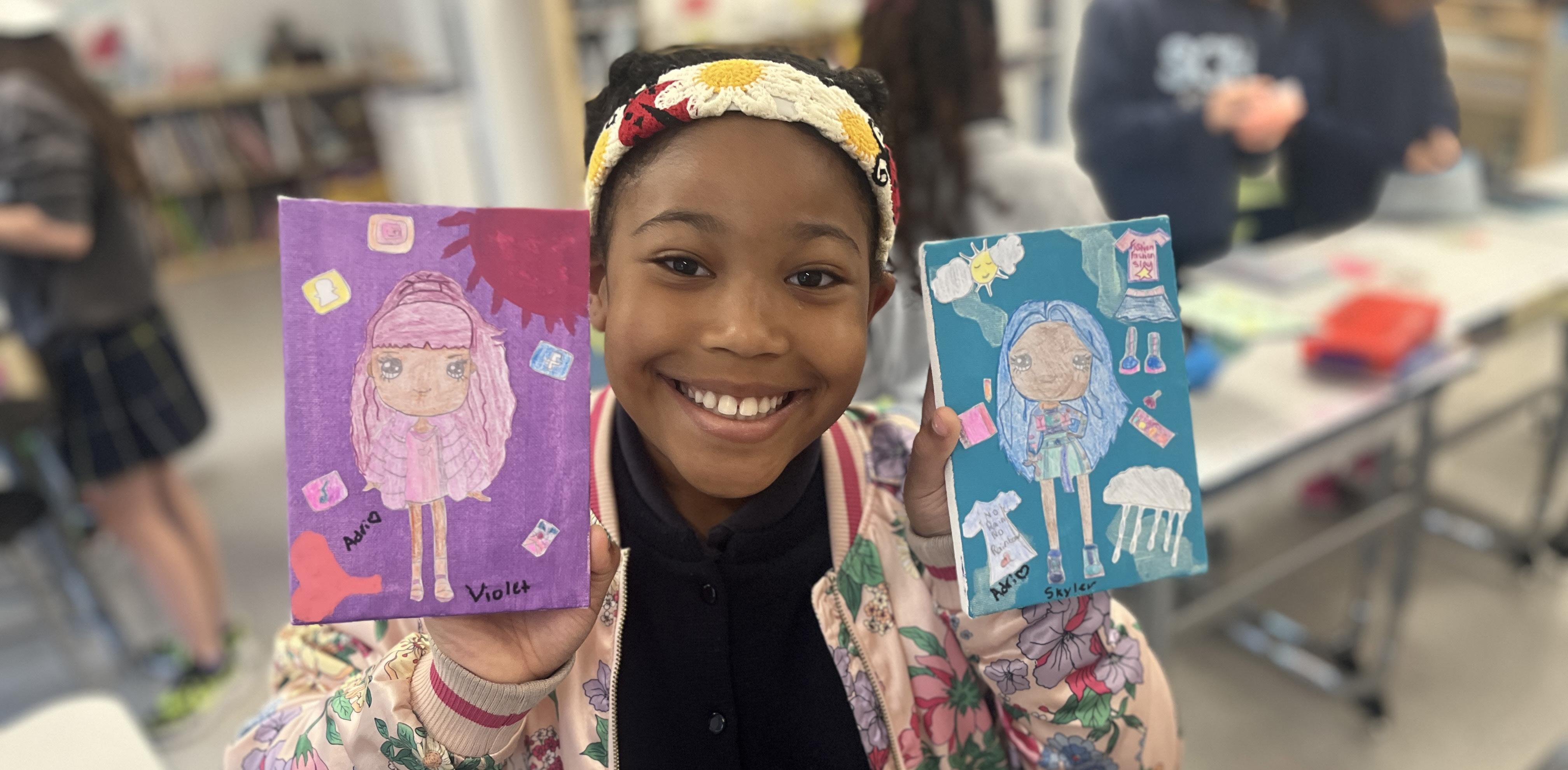
Fourth grade is the capstone year of Lower School and a time when students step into leadership, take on new challenges, and celebrate the friendships and skills they have built along the way. As the oldest students in the division, they guide younger peers as “4th Grade Brothers and Sisters” to Pre-K children, serve as admissions ambassadors for prospective families, and take the lead in telling the Lower School’s story by writing, producing, and filming the weekly Lower School news. They also learn about what skills and attributes are needed to be a leader and the impact they can make on their community.
Interdisciplinary studies challenge and inspire 4th graders. A Great Heart explores both the biological heart and the human qualities, like courage and compassion, that make a life meaningful. Extreme Settings examines how people respond to adversity through literature and real-world examples. The Redcoats Are Coming! brings Revolutionary War history to life from multiple perspectives, fostering critical thinking about conflict and change. Myth Making delves into the enduring stories cultures tell to explain the world and teach life’s lessons. Fourth grade prepares students to move forward with knowledge, empathy, resilience, and a sense of community.
As students prepare to transition to Middle School, 4th Grade offers distinct departmental experiences that build both independence and readiness. In P.E., they play sports such as squash, basketball, and soccer, strengthening athletic skills and developing sportsmanship. Science takes on a hands-on, applied approach: Students dissect animal hearts, build and program robots, maintain and observe individual terrariums, and study erosion patterns in the Wissahickon. Financial literacy comes to life in a classroom economy, where students manage budgets and make decisions that mirror real-world scenarios. Outdoor adventures, including a longer Wissahickon Bike-Hike, a hike at Ringing Rocks, and an on-campus camp-out, foster camaraderie, resilience, and a celebratory close to their Lower School years.

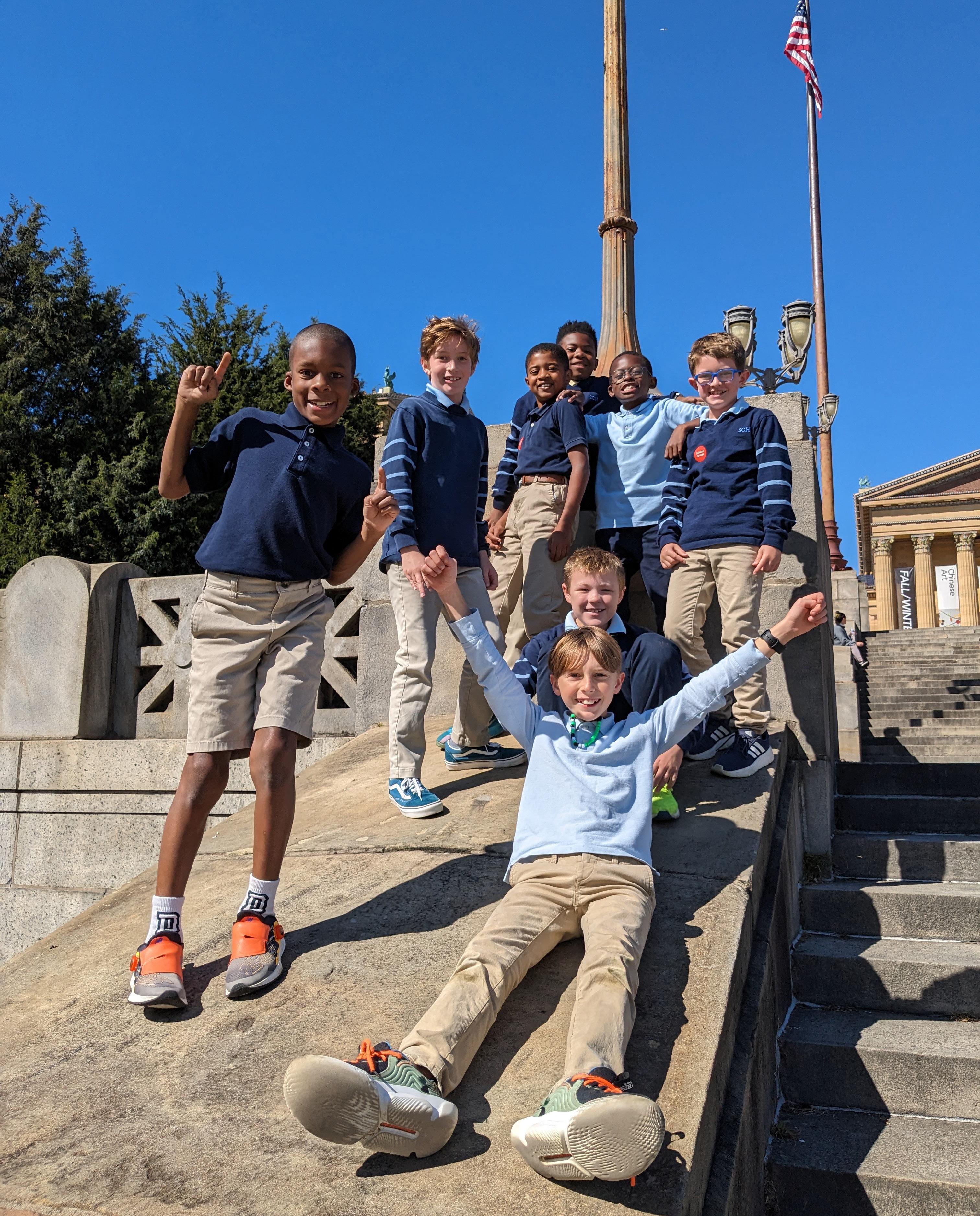

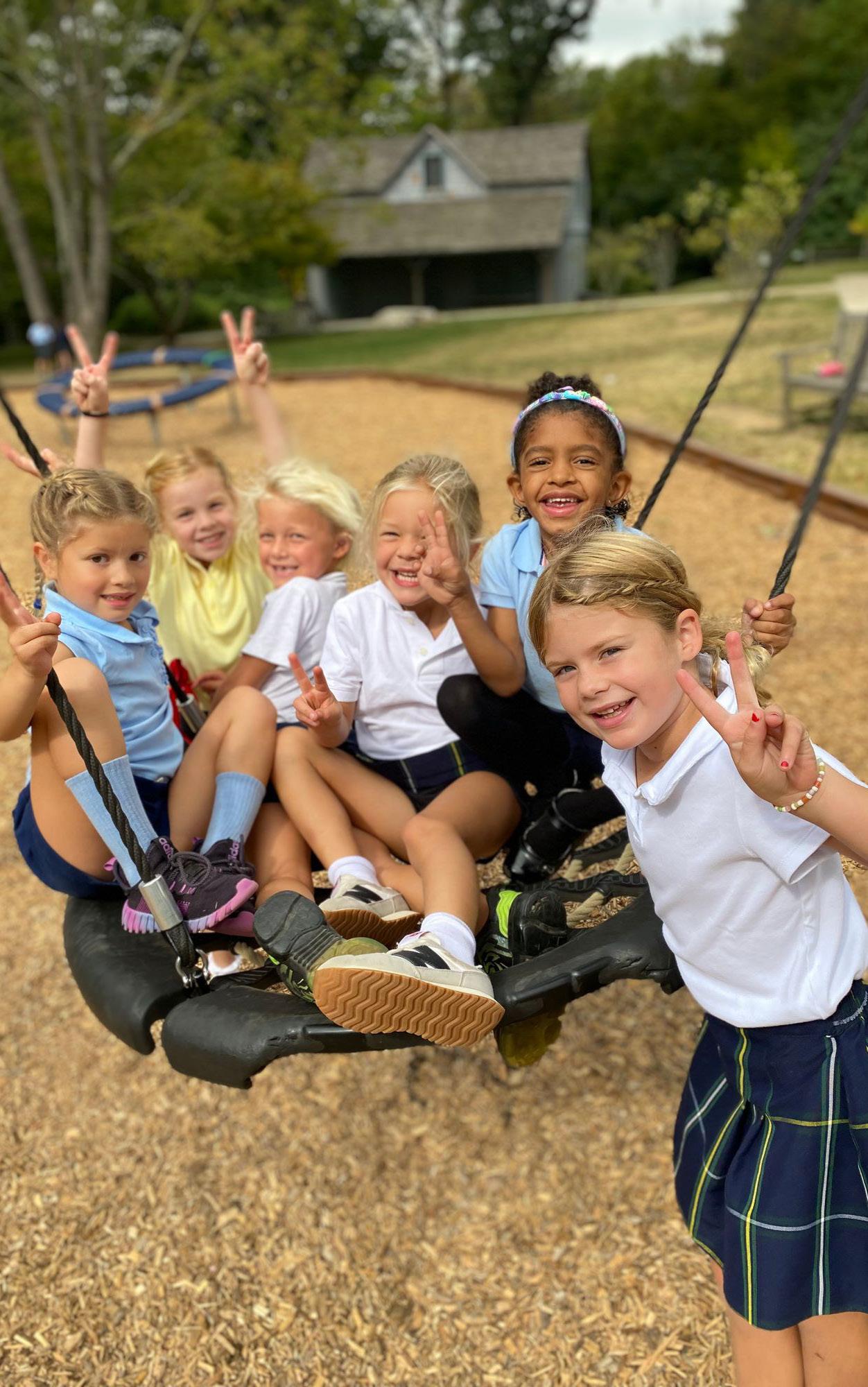

All of our academic and social-emotional programs are designed to deliver strong, engaging instruction in the classroom. When students need additional support, we provide access to a team of dedicated specialists who work in close partnership with teachers and families. On the academic side, we have two reading specialists and a learning specialist. On the social-emotional side, our team includes a psychologist, a counselor, and a student support specialist. These professionals offer targeted small-group instruction to help students master essential skills, and we also provide enrichment opportunities for students who are ready for additional challenge. Our goal is to ensure that every child feels supported and successful.
The McCausland Social-Emotional Wellness Center is a multi-tendrilled approach to navigating the challenges of childhood and developing the skills needed for social and emotional health. The Center’s robust programming focuses on each important constituency in the school. Students are provided with Social-Emotional Learning (SEL) instruction in each homeroom on a weekly basis through the Second Step curriculum as well as additional research-based methods and approaches. The SEL Center also provides a dedicated space for students to work with our school support staff.
The Second Step curriculum is the backbone of our SEL curriculum. Through intentional lessons and daily work around social-emotional topics, students build their ability to recognize and name their emotions, navigate peer conflict, and regulate themselves in their environment.
Our teachers use the Responsive Classroom approach in their work with all students. “The Responsive Classroom approach is a way of teaching that emphasizes social, emotional, and academic growth in a strong and safe school community.”

At SCH Academy, we curate brave spaces. We foster meaningful discussions and encourage students to engage, build bridges, and make connections. Our Diversity Leadership Team works to ensure that every member of the SCH community feels seen, valued, and supported. As part of our DEIB work, the Lower School incorporates a racial literacy curriculum called Pollyanna, which is taught in several lessons throughout the school year. We hope to plant seeds that will encourage and enhance racial literacy, geographical awareness, and cultural competence both in the classroom and throughout our students’ lives.

